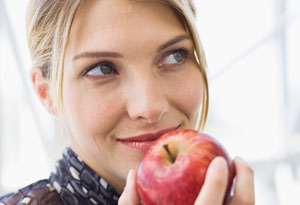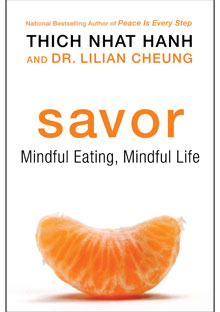Are You Really Savoring Your Apple? An Apple Meditation

Forget about stopping to smell the roses! What about stopping to savor your food? This simple mediation from Buddhist master Thich Nhat Hanh and nutritionist Dr. Lilian Cheung will show you how to find more joy in your life by slowing down and savoring every bite you eat.
Take an apple out of your refrigerator. Any apple will do. Wash it. Dry it. Before taking a bite, pause for a moment. Look at the apple in your palm and ask yourself: When I eat an apple, am I really enjoying eating it? Or, am I so pre-occupied with other thoughts that I miss the delights that the apple offers me?If you are like most of us, you answer "yes" to the second question much more often than the first. For most of our lives, we have eaten apple after apple without giving it a second thought. Yet in this mindless way of eating, we have denied ourselves the many delights present in the simple act of eating an apple. Why do that, especially when it is so easy to truly enjoy the apple?
The first thing is to give your undivided attention to eating the apple. When you eat the apple, just concentrate on eating the apple. Don't think of anything else. And most important, be still. Don't eat the apple while you are driving. Don't eat it while you are walking. Don't eat it while you are reading. Just be still. Being focused and slowing down will allow you to truly savor all the qualities the apple offers: its sweetness, aroma, freshness, juiciness, and crispness.
Next, pick up the apple from the palm of your hand and take a moment to look at it again. Breathe in awareness a few times to help you focus and become more in touch with how you feel about the apple. Most of the time, we barely look at the apple we are eating. We grab it, take a bite, chew it quickly and then swallow. This time, take note: What kind of apple is it? What color is it? How does it feel in your hand? What does it smell like? Going through these thoughts, you will begin to realize the apple is not simply a quick snack to quiet a grumbling stomach. It is something more complex, something part of a greater whole.
Then, give the apple a smile and slowly, mindfully take a bite, and chew it. Be aware of your in-breath and out-breath a few times to help you concentrate solely on eating the apple: what it feels like in your mouth; what it tastes like; what it's like to chew and swallow it. There is nothing else filling your mind as you chew—no projects, no deadlines, no worries, no "to do" list, no fears, no sorrow, no anger, no past, and no future. There is just the apple.
When you chew, know what you are chewing. Chew slowly and completely. Chew consciously, savoring the taste of the apple and its nourishment, immersing yourself in the process one hundred percent. This way, you really appreciate the apple as it is. And as you become fully aware of eating the apple, you also become fully aware of the present moment. You become fully engaged in the here and now. Living in the moment, you can really experience what the apple offers you, and you become more alive.

By eating the apple this way, truly savoring it, you have a taste of mindfulness, the state of awareness that comes from being fully immersed in the present moment. Letting go for those few short minutes and living in the here and now, you can begin to sense the pleasure and freedom from anxiety that a life lived in mindfulness can offer.
In today's world, mindless eating and mindless living are all too common. We are propelled by the fast pace of hi-tech living—high speed Internet, emails, instant messages and cell phones—and the expectation that we are always on call, always ready to respond instantly to any message we get. Thirty years ago, hardly anyone would have expected to receive a reply to a phone call or letter within the same day. Yet today, the pace of our lives is utterly harried and spinning out of control. We constantly have to respond to external stimuli and demands. We have less and less time to stop, stay focused and reflect on whatever is in front of us. We have much less time to be in touch with our inner selves—our thoughts, feelings, consciousness and how and why we have become the way we are, for better or worse. And our lives suffer because of it.
According to a 2006 article by Jon Mooallem in the New York Times Magazine, America's busy eaters find it is too inconvenient and difficult to eat a whole apple. So major food outlets now sell "value-added" apples—pre-sliced apples, packed in bags and coated with an all-natural flavorless sealant so that they won't turn brown or lose their crispness for up to three weeks. These apples epitomize the new food marketing concept of "snackability:" There are no crumbs and no fuss, nothing to interrupt the repetitive movement of hand to bag and food to mouth. Aside from the inherent lack of freshness in these "snackable" precut apples, they also promote mindless eating—in the car, in front of the TV, at the computer, whenever and wherever. And while there are certainly much less healthy snack foods than precut apple slices, the pattern of mindless eating is one we all experience and that food marketers promote with a vengeance.
Most of the time, we are eating on auto-pilot, eating on the run, eating our worries or anxieties from the day's demands, anticipations, irritations, and to-do lists. If we are not conscious of the food we eat, if we are not actively thinking about that apple, how can we taste it and get the pleasure of eating it?
Eating an apple mindfully is not only a pleasant experience, but it is good for our health as well. The adage "an apple a day keeps the doctor away" is actually backed by solid science. Research shows that eating apples can help prevent heart disease because the fiber and antioxidants they contain can prevent cholesterol build up in the blood vessels of the heart. The fiber in apples can also help move waste through the intestines, which can help lower the risk of problems such as irritable bowel syndrome. Eating the apple with the skin—especially when it is organic—is better than eating it without the skin, as half of the vitamin C is under the apple's skin; the skin itself is rich in phytochemicals, special plant compounds that may fight chronic disease. Apples are also packed with potassium, which can help keep blood pressure under control.
In today's world, mindless eating and mindless living are all too common. We are propelled by the fast pace of hi-tech living—high speed Internet, emails, instant messages and cell phones—and the expectation that we are always on call, always ready to respond instantly to any message we get. Thirty years ago, hardly anyone would have expected to receive a reply to a phone call or letter within the same day. Yet today, the pace of our lives is utterly harried and spinning out of control. We constantly have to respond to external stimuli and demands. We have less and less time to stop, stay focused and reflect on whatever is in front of us. We have much less time to be in touch with our inner selves—our thoughts, feelings, consciousness and how and why we have become the way we are, for better or worse. And our lives suffer because of it.
According to a 2006 article by Jon Mooallem in the New York Times Magazine, America's busy eaters find it is too inconvenient and difficult to eat a whole apple. So major food outlets now sell "value-added" apples—pre-sliced apples, packed in bags and coated with an all-natural flavorless sealant so that they won't turn brown or lose their crispness for up to three weeks. These apples epitomize the new food marketing concept of "snackability:" There are no crumbs and no fuss, nothing to interrupt the repetitive movement of hand to bag and food to mouth. Aside from the inherent lack of freshness in these "snackable" precut apples, they also promote mindless eating—in the car, in front of the TV, at the computer, whenever and wherever. And while there are certainly much less healthy snack foods than precut apple slices, the pattern of mindless eating is one we all experience and that food marketers promote with a vengeance.
Most of the time, we are eating on auto-pilot, eating on the run, eating our worries or anxieties from the day's demands, anticipations, irritations, and to-do lists. If we are not conscious of the food we eat, if we are not actively thinking about that apple, how can we taste it and get the pleasure of eating it?
Eating an apple mindfully is not only a pleasant experience, but it is good for our health as well. The adage "an apple a day keeps the doctor away" is actually backed by solid science. Research shows that eating apples can help prevent heart disease because the fiber and antioxidants they contain can prevent cholesterol build up in the blood vessels of the heart. The fiber in apples can also help move waste through the intestines, which can help lower the risk of problems such as irritable bowel syndrome. Eating the apple with the skin—especially when it is organic—is better than eating it without the skin, as half of the vitamin C is under the apple's skin; the skin itself is rich in phytochemicals, special plant compounds that may fight chronic disease. Apples are also packed with potassium, which can help keep blood pressure under control.

Photo: Nan Sao
Beyond the health benefits and pleasure an apple can provide when we view the apple on an even grander scale, we can see it as a representative of our cosmos. Look deeply at the apple in your hand and you see the farmer who tended the apple tree; the blossom that became the fruit; the fertile earth, the organic material from decayed remains of prehistoric marine animals and algae, and the hydrocarbons themselves; the sunshine, the clouds, and the rain. Without the combination of these far-reaching elements and without the help of many people, the apple would simply not exist.
At its most essential, the apple you hold is a manifestation of the wonderful presence of life. It is interconnected with all that is. It contains the whole universe, it is an ambassador of the cosmos coming to nourish our existence. It feeds our body, and if we eat it mindfully, it also feeds our soul and recharges our spirit.
Eating an apple consciously is to have a new awareness of the apple, of our world and of our own life. It celebrates nature, honoring what Mother Earth and the cosmos have offered us. Eating an apple with mindfulness is a meditation and can be deeply spiritual. With this awareness and insight, you begin to have a greater feeling of gratitude for and appreciation of the food you eat, and your connection to nature and all others in our world. As the apple becomes more real and vibrant, your life becomes more real and vibrant. Savoring the apple is mindfulness at work. And it is mindfulness that will help you reconnect with yourself and become healthier in mind, body and spirit now and in the future.
Thich Nhat Hanh is a Vietnamese Buddhist Zen Master, poet, scholar and peace activist. His courageous efforts to generate peace in Vietnam moved Dr. Martin Luther King Jr. to nominate him for the Nobel Peace Prize in 1967. Thich Nhat Hanh is the author of many books including such important classics as Peace is Every Step, The Art of Power and his most recent,Savor: Mindful Eating, Mindful Life. He lives in Plum Village, his meditation center in France, and travels worldwide.
Dr. Lilian Cheung, D.Sc., R.D., is a lecturer and Director of Health Promotion and Communication at the Harvard School of Public Health’s Department of Nutrition. Cheung has been a student of Thich Nhat Hanh since 1997.
More Words of Wisdom from Thich Nhat Hanh:
How to change your eating habits forever
5 things to think about when you eat
Thich Nhat Hanh shares the secret to happiness with Oprah
12 of his most inspiring quotes
At its most essential, the apple you hold is a manifestation of the wonderful presence of life. It is interconnected with all that is. It contains the whole universe, it is an ambassador of the cosmos coming to nourish our existence. It feeds our body, and if we eat it mindfully, it also feeds our soul and recharges our spirit.
Eating an apple consciously is to have a new awareness of the apple, of our world and of our own life. It celebrates nature, honoring what Mother Earth and the cosmos have offered us. Eating an apple with mindfulness is a meditation and can be deeply spiritual. With this awareness and insight, you begin to have a greater feeling of gratitude for and appreciation of the food you eat, and your connection to nature and all others in our world. As the apple becomes more real and vibrant, your life becomes more real and vibrant. Savoring the apple is mindfulness at work. And it is mindfulness that will help you reconnect with yourself and become healthier in mind, body and spirit now and in the future.
Thich Nhat Hanh is a Vietnamese Buddhist Zen Master, poet, scholar and peace activist. His courageous efforts to generate peace in Vietnam moved Dr. Martin Luther King Jr. to nominate him for the Nobel Peace Prize in 1967. Thich Nhat Hanh is the author of many books including such important classics as Peace is Every Step, The Art of Power and his most recent,Savor: Mindful Eating, Mindful Life. He lives in Plum Village, his meditation center in France, and travels worldwide.
Dr. Lilian Cheung, D.Sc., R.D., is a lecturer and Director of Health Promotion and Communication at the Harvard School of Public Health’s Department of Nutrition. Cheung has been a student of Thich Nhat Hanh since 1997.
More Words of Wisdom from Thich Nhat Hanh:
How to change your eating habits forever
5 things to think about when you eat
Thich Nhat Hanh shares the secret to happiness with Oprah
12 of his most inspiring quotes
Reprinted with permission from SAVOR: Mindful Eating, Mindful Life (c) 2010 byThich Nhat Hanh and Lilian Cheung, published by HarperOne.



